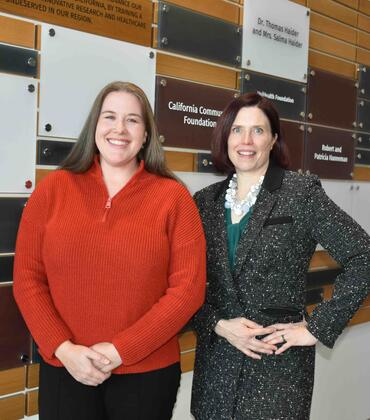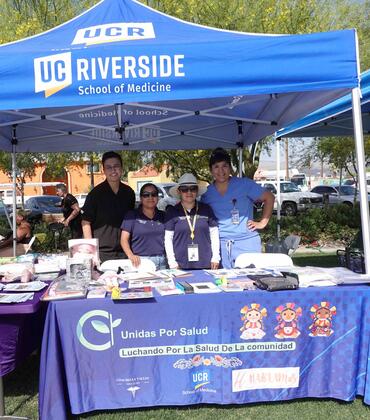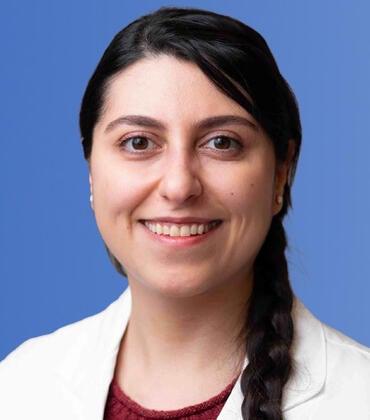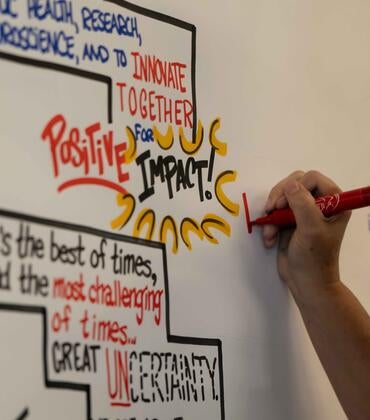
For Lisa R. Fortuna, MD, MPH, MDiv, a love of working with children and helping them transition successfully to adulthood initially drew her to specialize in pediatrics. Yet she soon noticed that young people were at a particularly critical stage of their lives regarding their mental health.
“Even though it's such a wonderful time of new opportunities, it's also a vulnerable time where we see the emergence of mental health problems, and it’s important to support young people at that age,” said Fortuna, now chair of the Department of Psychiatry and Neuroscience at the UCR School of Medicine. “I decided to make the change to child and adolescent psychiatry because I was so interested in those stories and narratives and how young people can be helped to thrive.”
Fortuna has focused her more than two-decade career on public and mental health, most recently as chief of psychiatry at Zuckerberg San Francisco General Hospital at UC San Francisco and professor at UCSF School of Medicine. In 2023, she brought her expertise to UCR, attracted by the School of Medicine’s mission to help underserved communities in the area. “I think it's a very special school in its efforts to increase that workforce that is very well matched to the community,” Fortuna said. “I was very excited to work with others here who have the same mission.”
Expanding culturally competent mental health care
Fortuna noted that the Inland Empire has disproportionately fewer psychiatry and behavioral health services compared to other regions, in line with the area’s overall physician shortage. As a result, many of the families she now works with at UCR Health have trouble finding an available provider. “That has a big impact, potentially negatively, for outcomes for young people and the next generation at so many levels, from health to well-being to socioeconomically,” she said.
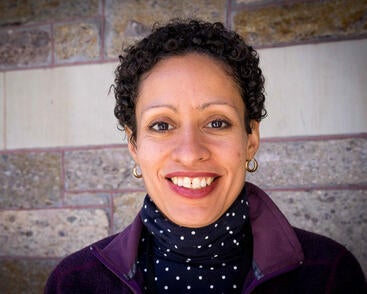
Beyond patients’ ability to access mental health services, providers’ diversity and cultural understanding is also crucial for effective care. Fortuna’s Spanish language abilities and Puerto Rican background allow her to better communicate and form deeper connections with her patients, strengthening the care she provides. She also highlighted the cultural and language diversity among students and residents at the SOM. “We can bring all that knowledge and wisdom about how we can interconnect based on language and culture and understand our patients better,” she said.
“There's a lot of interest from patients in finding child and adolescent psychiatrists that will work collaboratively with them, that will be culturally appropriate and humble, that will really listen to parents and youths' voices,” added Fortuna, who also recently contributed to a related report detailing the effect of aggressive immigration practices on children's mental health. “I continue to see those types of needs here at UCR Health, and as it's a growing practice, I hope that we keep seeing more and more engagement and inclusion of our community in our mental health services.”
Improving patient care through teaching and research
Fortuna stressed the importance of working with patients and medical students to both maintain and improve her clinical skills. “I always feel that I learn so much from working with patients, and I also now learn so much from seeing patients with residents and teaching,” she said.
She enjoys collaborating with residents and medical students on research, too, particularly projects that have the potential to serve the region. One UCR psychiatry resident that Fortuna has been mentoring, Paula Mendoza, MD, aims to become a researcher and child psychiatrist in the Inland Empire. Working with Fortuna and SOM student Kimberly Del Toro, Mendoza is currently creating a tool to measure adolescents’ attitudes about and knowledge of mental health care, particularly among Spanish-speaking youth. Eventually, the goal is to create effective interventions to improve their trust in mental health care.
“Seeing students and mentees doing fabulous work and creating their own ideas and presenting them makes me feel really positive about the next generation,” Fortuna said.
For Mendoza’s part, "Dr. Fortuna has provided invaluable mentorship in the development of the mental health literacy tool with her extensive knowledge in co-developing projects [and] community-based participatory research,” she said. “Her mentorship and leadership in research and advocacy strongly advance the SOM’s mission to increase diversity in the physician workforce in the Inland Empire.”
Beyond mentoring upcoming physicians, Fortuna is working extensively on her own community-focused research. In her nearly two years at the SOM, she has transferred NIH research grants to the school from her prior institution and obtained additional funding at UCR. Her projects include one funded by the Substance Abuse and Mental Health Services Administration (SAMHSA) that focuses on improving medical student education to more effectively treat substance use disorders.
She is still working to advance community-focused grants at UCR. One of her NIH grants focuses on developing an app to give adolescents information about coping skills and mental health resources. The goal, Fortuna said, is to implement the app in the Los Angeles Unified School District, other schools in the local area, and in primary care . “I can't wait to really kick off and get it in the clinics and in the schools, so we're learning from youth and families and improving our intervention,” she said.
Indeed, one of Fortuna’s main goals at the SOM is to expand on collaborations with the community. She noted that community health organizations, churches, and other groups providing social services are most familiar with the community’s needs. “Especially now, when people are experiencing a lot of hard times, we have to listen to the community and see how we can be the helpers,” she said. “In my role as chair of the department of psychiatry and neuroscience, I just want to see that grow and grow and grow.”
Finding joy in making a difference for the future
For the moment, Fortuna enjoys teaching the next generation of physicians to best help their patients. “At this stage of my career, I want to get that next generation of providers thinking critically about what we can do better,” she said. “The thing that brings me joy and helps me get past difficulties is the team of people, and younger people who are going to go forth and really carry this work forward.”
Fortuna also takes pride in attracting new faculty members who are committed to the SOM’s mission, like UCR Health psychiatrist Kevin Gutierrez, MD, and Peter Ureste, MD, director of the SOM’s Psychiatry Residency Program.
“[Ureste] was born in Riverside, and he is back with full force ahead interest in moving our mission forward,” Fortuna said. “He is so clearly aligned with that mission and passionate and such a good person, and so I'm really excited about what he brings to the teaching and our residency training.”
“The fact that I've brought these fabulous people, that's the thing that brings me joy,” she added. “That's why I wanted to be a chair, to work with others to make the best program we can.”
